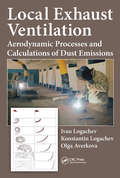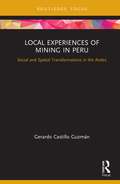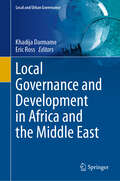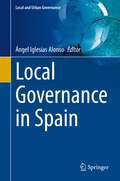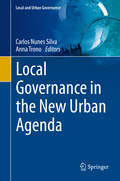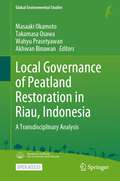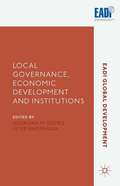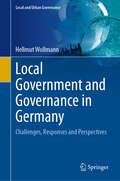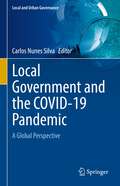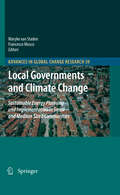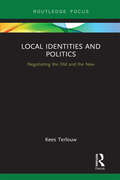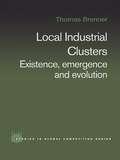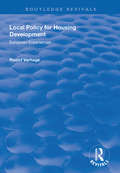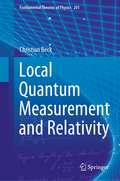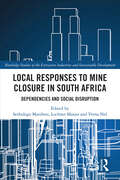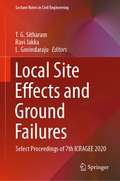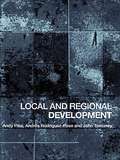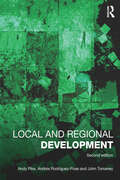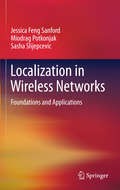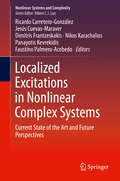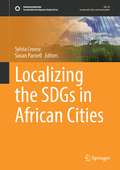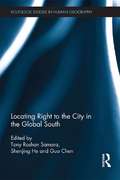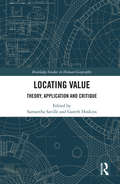- Table View
- List View
Local Exhaust Ventilation: Aerodynamic Processes and Calculations of Dust Emissions
by Ivan Logachev Konstantin Logachev Olga AverkovaThis book examines the computations of gas-borne dust flows in local exhaust ventilation systems and provides practical recommendations for the energy-efficient containment of dust emissions. It discusses basic approaches to operational energy savings for local exhaust ventilation systems, including shaping intake openings of open local exhaust devices after determining boundaries of vortex areas, increasing the working distance of suction openings, inhibiting carryover of dust into aspiration network by promoting rotational aerodynamic fields, and more. Color photos throughout illustrate dust behavior, flow lines, and patterns.
Local Experiences of Mining in Peru: Social and Spatial Transformations in the Andes (Routledge Studies of the Extractive Industries and Sustainable Development)
by Gerardo Castillo GuzmánThis book uses a multimethod approach to examine local experience of contemporary mining development in the Peruvian Andes, creating an understanding of the transformations that rural societies experience in this context. Mining is a major component of economic growth in many resource endowed countries, whilst also causing mixed social, cultural, and environmental effects. Most current literature on contemporary mining in Peru is largely focussed on conflict; however, in this text, the author takes a differing approach by examining the experiences of families in the vicinity of Rio Tinto’s La Granja exploration copper project, Northern Peru, an area with great significance due to the mining investment and development, which has taken place over the past 25 years. The book first provides a critical discussion about production of space theories, and debates on spatial mobility, highlighting their relevance to understanding large-scale mining developments, especially in the Peruvian Andes. The following chapters analyze spatial transformations mining development has prompted, focusing on four axes: access to space, production, mobility, and representations of space. A comprehensive narrative is constructed drawing on diverse voices and perspectives, including those of family heads and their partners, local leaders, company employees, and social scientists. The book concludes by discussing how the findings challenge some of the current accounts of the social effects of mining developement on rural communities and pose significant implications for sustainable development programs and place-based practices. By taking an interdisciplinary approach, this book will appeal to a wide audience including geographers, social anthropologists, and social scientists interested in the social effects of mining as well as researchers interested in current Latin American Studies and Rural Development.
Local Governance and Development in Africa and the Middle East (Local and Urban Governance)
by Eric Ross Khadija DarmameThis edited volume surveys how current local governance policies and development strategies across Africa and the Middle east are advancing Sustainable Development Goals (SDGs). Morocco's recent experience with local development strategies serves as starting point for the discussion. Over the past decade, Morocco has undertaken a variety of initiatives aimed at reducing poverty and social inequalities and providing essential services to marginalized communities. These initiatives provide great opportunities to reshape the spatial organization of regions, and to address chronic local issues of infrastructure and investment. Local governance is the most direct way of providing basic services to populations, helping to alleviate socio-spatial inequalities. Also, it is and will continue to be the best way to engage people and local governments in economic, social and human development agendas. However, placing local governance at the heart of development strategies requires going well beyond participatory approaches to policy making. Local communities and their governments need to be empowered. As responses to the Covid19 epidemic have laid bare, new and more efficient modes of territorial governance are needed at local and regional levels if current global-scale challenges are to be met. While development and governance strategies like Morocco's are framed by global agreements and standards, there is a need to understand them at the regional scale. Are there discernible patterns in how African and Middle Eastern countries design and implement them? This volume assembles case studies from across the region, allowing for understandings that transcend the usual spatial dichotomies between "North" and "Sub-Saharan" Africa, between Africa and the Middle East, and between the "Anglophone" and "Francophone" spheres. The volume builds upon an international conference on the topic held at Al Akhawayn University in Ifrane, Morocco Morocco in February of 2022. The volume is aimed at a readership of researchers and development practitioners, and will be of most direct benefit to advanced undergraduate and graduate-level students.
Local Governance in Spain (Local and Urban Governance)
by Ángel Iglesias AlonsoThe book addresses in detail local governance in Spain. In recent decades, local governments in Europe have increasingly found themselves under pressure from a multitude of new challenges, such as demographic change, climate change, fiscal austerity policies, digitization, the demand for more citizen participation in local affairs, and the migration crisis in some of them, to name just a few. Consequently, a wave of political and administrative reforms to address these challenges, pressures and problems, has changed local governance in many countries. In part, these changes were the result of reform policies introduced by national and state governments, often triggered by austerity policies, which has become an overwhelming reality for Spanish local governments that have been forced to introduce innovations in local governance. This book aims to give an account of these innovations in local governance in Spain.This book considers the local political-administrative structure in its dimensions, focusing on the analysis of its party system, electoral competition and political behavior in the local arena, as well as on local finances, all of which are determining elements in urban and rural governance processes. On the occasion of the recent crisis unleashed by Covid-19, the book will also deal with local governance in crisis situations. The book will also contextualize local governance processes in Spain in relation to the trends in local governance observed in other European countries.
Local Governance in the New Urban Agenda (Local and Urban Governance)
by Anna Trono Carlos Nunes SilvaThe book explores and discusses some of the changes, challenges and opportunities confronting local governance in the context of the new urban paradigm associated with the HABITAT III New Urban Agenda, a 20-year strategy for sustainable urbanization, adopted in October 2016 in Quito, Ecuador. The chapters included in the book address public policy issues from different theoretical perspectives and methodological approaches, written by authors from different academic disciplines within the broad area of social sciences (Geography, Political Science, Public Administration, Spatial Planning, Law, Regional Science, among other fields), and offer an inter-disciplinary vision of these issues. The chapters are written by members of the International Geographical Union (IGU) Commission on Geography of Governance.
Local Governance of Peatland Restoration in Riau, Indonesia: A Transdisciplinary Analysis (Global Environmental Studies)
by Masaaki Okamoto Takamasa Osawa Wahyu Prasetyawan Akhwan BinawanThis open access book is one in a series of four volumes introducing peatland conservation and restoration in Indonesia. It focuses on local governance, in particular on regional and local perspectives in Riau, the most peat-destructed province of Indonesia. The book fills a vital gap in the existing literature that overlooks social science and humanities perspectives. Written by authors from different disciplines and backgrounds (including scholars and NGO activists), the approaches to the topic are various and unique, including analysis of GPS logs, social media, geospatial assessments, online interviews (conducted due to the Covid-19 pandemic), and more conventional questionnaires and surveys of community members. The chapters cover an interdisciplinary understanding of peatland destruction and broadly offer insights into environmental governance. While presenting combined studies of established fieldwork methodologies and contemporary technology such as drones and geospatial information, the book also explores the potential of long-distance research with rural communities through online facilitation, which was brought about by Covid-19, but that may have longterm implications. Readers will gain a comprehensive understanding of the complexities surrounding peatland conservation and restoration and recognize the significance of locally inclusive approaches that use contemporary but accessible technologies to sustainably govern the globally important resource of peatland. That approach would be useful for other environmentally fragile but important regions and give some ideas to achieve the United Nations’ SDGs for 1)No Poverty, 5)Gender Equality, 13)Climate Action, 15)Life of Land.
Local Governance, Economic Development and Institutions (EADI Global Development Series)
by Peter Knorringa Georgina GómezLocal Government and Governance in Germany: Challenges, Responses and Perspectives (Local and Urban Governance)
by Hellmut WollmannThe book aims at outlining key political, functional, administrative and financial features of Germany’s local government system and at placing them in a (European) comparative perspective. In pursuing an “institutionalist” approach it focuses on discussing whether, how and why the position and activities of local government in the intergovernmental (“multi-level”) setting have changed vis-à-vis multiple challenges and crises. Among the latter tasks such as coping with the energy crisis, the influx of asylum seekers and refugees, the digitization of local administration and the Covid19 pandemic loom large. Ranking among the functionally and politically strongest among European countries Germany’s local government plays an important role in the German federal system and beyond in the European Union. Over the years it has proved a remarkable problem solving and innovative capacity. Hence, the German case may attract the attention of a European and international audience interested in local government and governance and practices.
Local Government and the COVID-19 Pandemic: A Global Perspective (Local and Urban Governance)
by Carlos Nunes SilvaThe book provides a global perspective of local government response towards the COVID-19 pandemic through the analysis of a sample of countries in all continents. It examines the responses of local government, as well as the responses local government developed in articulation with other tiers of government and with civil society organizations, and explores the social, economic and policy impacts of the pandemic. The book offers an innovative contribution on the role of local government during the pandemic and discusses lessons for the future. The COVID-19 pandemic had a global impact on public health, in the well-being of citizens, in the economy, on civic life, in the provision of public services, and in the governance of cities and other human settlements, although in an uneven form across countries, cities and local communities. Cities and local governments have been acting decisively to apply the policy measures defined at national level to the specific local conditions. COVID-19 has exposed the inadequacy of the crisis response infrastructures and policies at both national and local levels in these countries as well as in many others across the world. But it also exposed much broader and deeper weaknesses that result from how societies are organized, namely the insecure life a substantial proportion of citizens have, as a result of economic and social policies followed in previous decades, which accentuated the impacts of the lockdown measures on employment, income, housing, among a myriad of other social dimensions. Besides the analysis of how governments, and local government, responded to the public health issues raised by the spread of the virus, the book deals also with the diversity of responses local governments have adopted and implemented in the countries, regions, cities and metropolitan areas. The analysis of these policy responses indicates that previously unthinkable policies can surprisingly be implemented at both national and local levels.
Local Governments and Climate Change
by Maryke Van Staden Francesco MuscoThe focus of this publication is on how small and medium-sized communities in Europe are effectively responding to climate change, with a particular focus on different approaches used in sustainable energy planning and implementation. A number of cases presented show the result of different (and often combined) motivations and actions. The most effective responses are those with a holistic, integrated and long-term approach, addressing both climate change mitigation and adaptation, based on citizen and other local stakeholder involvement. Local climate action means addressing different sectors, from buildings to waste, but also involving the industry and business sectors. The focus is on engaging communities on a large scale. Local governments play an essential role in this regard: creating a vision for the community, developing relevant strategies, implementing effective policies and rolling out actions - together with other actors. They lead citizens, act in an exemplary manner, and improve energy use in services. The context they act in is also important, influencing approaches taken, with (enabling or blocking) framework conditions, financing, and energy security addressed, as well as a number of important international and European community-specific developments are presented.
Local Identities and Politics: Negotiating the Old and the New
by Kees TerlouwThe relation between identity and space is strong and generates many conflicts. Most people attach great importance to their local community and its identity. The possibility of change can cause turmoil and become fertile ground for staking new identities. Understanding how these changes can take place is important to the future of community cohesion across the world. This book gives a detailed analysis of how different stakeholders in two Dutch municipalities use and adapt their identity discourses to deal with changing circumstances, situating this work within a wider international context through global comparisons. The growing spatial interdependence and political pressures for municipal cooperation or amalgamation creates not only threats, but also opportunities for stakeholders in local communities to transform their local identities. By studying how local communities attach to local identities, a new conceptual framework can be formed, informed by lively accounts from residents on the rich and varied use of identity in their communities and their concerns over future developments. This is valuable reading for students, scholars and researchers working in geography, politics, sociology and cultural studies.
Local Industrial Clusters: Existence, Emergence and Evolution (Routledge Studies in Global Competition #Vol. 20)
by Thomas BrennerThe key approach taken in this book is that all local economic clusters have something in common - specific case-studies are thus put into wider perspective in a masterly study that will be of keen interest to both economists and geographers.
Local Planning In Practice
by Michael Bruton David Nicholson"First Published in 1991, Routledge is an imprint of Taylor & Francis, an informa company."
Local Policy for Housing Development: European Experiences (Routledge Revivals)
by Roelof VerhageThis title was first published in 2002: When a developer wants to realize a housing scheme, what can the local planning authority do to assure that the resulting residential environment is of a high quality? This book explores the question through a cross-national comparison of housing development processes in The Netherlands, the United Kingdom, Germany and France. It analyzes how decisions about the residential environment are made in different situations, and by whom. By applying this analysis to housing development processes in different countries, the book paints a picture of how public policy and market mechanisms together influence the development of housing. From this, conclusions are drawn about how local planning authorities can achieve their objectives concerning the quality of housing areas.
Local Quantum Measurement and Relativity (Fundamental Theories of Physics #201)
by Christian BeckThis book treats various aspects of the quantum theory of measurement, partially in a relativistic framework. Measurement(-like) processes in quantum theory are identified and analysed; and the quantum operator formalism is derived in full generality without postulating operators as observables. Consistency conditions are derived, expressing the requirement of Lorentz-frame independence of outcomes of spacelike separated measurements and implying the impossibility of using quantum nonlocality to send signals faster than light. Local commutativity is scrutinized. The localization problem of relativistic quantum theory is studied, including comprehensive derivation of the theorems of Hegerfeld, Malament and Reeh-Schlieder. Finally, the quantum formalism is derived from the dynamics of particles with definite positions in Bohmian mechanics.
Local Responses to Mine Closure in South Africa: Dependencies and Social Disruption (Routledge Studies of the Extractive Industries and Sustainable Development)
by Lochner Marais Sethulego Matebesi Verna NelThis book investigates mine closure and local responses in South Africa, linking dependencies and social disruption. Mine closure presents a major challenge to the mining industry and government policymakers globally, but particularly in the Global South. South Africa is experiencing notable numbers of mine closures, and this book explores the notion of social disruption, a concept often applied to describe the effects of mine growth on communities but often neglecting the impact of mine closures. The book begins with three theoretical chapters that discuss theory, closure cost frameworks and policy development in South Africa. It uses evolutionary governance theory to show how mining creates dependencies and how mining growth often blinds communities and governments to the likelihood of closure. Too easily, mining goes ahead with no concern for the possibility, or indeed inevitability, of eventual closure and how mining communities will cope. These impacts are showcased through eight place-based case studies from across South Africa, one focusing on mine workers, to demonstrate that mine closure causes significant social disruption. This book will be of interest to students and scholars researching the social impacts of mining and the extractive industries, social geography and sustainable development, as well as policymakers and practitioners working with mine closure and social impact assessments.
Local Site Effects and Ground Failures: Select Proceedings of 7th ICRAGEE 2020 (Lecture Notes in Civil Engineering #117)
by T. G. Sitharam L. Govindaraju Ravi JakkaThis volume presents select papers presented at the 7th International Conference on Recent Advances in Geotechnical Earthquake Engineering and Soil Dynamics. The papers discuss advances in the fields of soil dynamics and geotechnical earthquake engineering. Some of the themes include ground response analysis & local site effect, seismic slope stability and landslides, application of AI in geotechnical earthquake engineering, etc. A strong emphasis is placed on connecting academic research and field practice, with many examples, case studies, best practices, and discussions on performance based design. This volume will be of interest to researchers and practicing engineers alike.
Local and Regional Development
by Andy Pike Andrés Rodriguez-Pose John Tomaney Andres Rodriguez-PoseLocal and regional development is an increasingly global issue. For localities and regions, the challenge of enhancing prosperity, improving wellbeing and increasing living standards has become acute for localities and regions formerly considered discrete parts of the ‘developed’ and ‘developing’ worlds. Amid concern over the definitions and sustainability of ‘development’, a spectre has emerged of deepened unevenness and sharpened inequalities in the development prospects for particular social groups and territories. Local and Regional Development engages and addresses the key questions: what are the principles and values that shape definitions and strategies of local and regional development? What are the conceptual and theoretical frameworks capable of understanding and interpreting local and regional development? What are the main policy interventions and instruments? How do localities and regions attempt to effect development in practice? What kinds of local and regional development should we be pursuing? This book addresses the fundamental issues of ‘what kind of local and regional development and for whom?’, frameworks of understanding, and instruments and policies. It outlines what a holistic, progressive and sustainable local and regional development might constitute before reflecting on its limits and political renewal. With the growing international importance of local and regional development, this book is an essential student purchase, illustrated throughout with maps, figures and case studies from Asia, Europe, and Central and North America.
Local and Regional Development
by Andy Pike Andrés Rodriguez-Pose John TomaneyActors and institutions in localities and regions across the world are seeking prosperity and well-being amidst tumultuous and disruptive shifts and transitions generated by: an increasingly globalised, knowledge-intensive capitalism; global financial instability, volatility and crisis; concerns about economic, social and ecological sustainability, climate change and resource shortages; new multi-actor and multi-level systems of government and governance and a re-ordering of the international political economy; state austerity and retrenchment; and, new and reformed approaches to intervention, policy and institutions for local and regional development. Local and Regional Development provides an accessible, critical and integrated examination of local and regional development theory, institutions and policy in this changing context. Amidst its rising importance, the book addresses the fundamental issues of ‘what kind of local and regional development and for whom?’, its purposes, principles and values, frameworks of understanding, approaches and interventions, and integrated approaches to local and regional development throughout the world. The approach provides a theoretically informed, critical analysis of contemporary local and regional development in an international and multi-disciplinary context, grounded in concrete empirical analysis from experiences in the global North and South. It concludes by identifying what might constitute holistic, inclusive, progressive and sustainable local and regional development, and reflecting upon its limits and political renewal.
Local, Slow and Sustainable Fashion: Wool as a Fabric for Change
by Ingun Grimstad Klepp Tone Skårdal TobiassonThis book explores the importance of the agriculturally-based fiber and textile industry, and how local, small-scale operations and markets, coupled with a connection to soil health, can lead the way to new transformative changes. It draws on a four-year research project on Norwegian wool, as well as similar studies in Poland and Portugal. It also explores the role of women and the Indigenous perspective: in Europe this will constitute Sami and Inuit, in Northern America the Inuit and First Nations in Canada, along with Native Americans. Born out of academic interest in the slow food movement, the importance of local raw materials has been put under the spotlight in recent years. Meanwhile, the havoc wreaked by the fast fashion industry has been drawing attention to the need for a new, sustainable approach to clothing and textile manufacture. This edited collection is unique in its scope, taking the conversation beyond traditional debates around fast fashion and agriculture, and examining how textile industry is rooted in the land, and within society and community. Featuring a diverse range of authors, the book will be valuable reading for academics interested in sustainable management, the study of consumption, the study of Indigenous perspectives, and the study of agricultural practices.
Localization in Wireless Networks
by Miodrag Potkonjak Jessica Feng Sanford Sasha SlijepcevicIn a computational tour-de-force, this volume wipes away a host of problems related to location discovery in wireless ad-hoc sensor networks. WASNs have recognized potential in many applications that are location-dependent, yet are heavily constrained by factors such as cost and energy consumption. Their "ad-hoc" nature, with direct rather than mediated connections between a network of wireless devices, adds another layer of difficulty. Basing this work entirely on data-driven, coordinated algorithms, the author's aim is to present location discovery techniques that are highly accurate--and which fit user criteria. The research deploys nonparametric statistical methods and relies on the concept of joint probability to construct error (including location error) models and environmental field models. It also addresses system issues such as the broadcast and scheduling of the beacon. Reporting an impressive accuracy gain of almost 17 percent, and organized in a clear, sequential manner, this book represents a stride forward in wireless localization.
Localized Excitations in Nonlinear Complex Systems
by Jesús Cuevas-Maraver Ricardo Carretero-González Dimitri Frantzeskakis Nikos Karachalios Panayotis Kevrekidis Faustino Palmero-AcebedoThe study of nonlinear localized excitations is a long-standing challenge for research in basic and applied science, as well as engineering, due to their importance in understanding and predicting phenomena arising in nonlinear and complex systems, but also due to their potential for the development and design of novel applications. This volume is a compilation of chapters representing the current state-of-the-art on the field of localized excitations and their role in the dynamics of complex physical systems.
Localizing the SDGs in African Cities (Sustainable Development Goals Series)
by Susan Parnell Sylvia CroeseThis volume brings together a unique set of interventions from a variety of contributors to bridge the gap between research and policy with a distinct focus on Africa, drawing on work conducted as part of multiple interconnected research projects and networks on the Sustainable Development Goals (SDGs) and global policy implementation in African cities. Through the framework of the SDGs, and in particular Goal 11, the book aims to contribute to generating new knowledge about approaches to SDG localization that are grounded in complex and diverse local contexts, needs and realities, integrated perspectives and collaborative research. The volume draws together contributions from urban experts from different professional and disciplinary backgrounds, ranging from the fields of governance, planning, data, sustainability, health and finance, to provide critical insight into the current dynamics, actors, blind spots, constraints and also good practices and opportunities for realizing the SDGs in Africa. Readers will gain detailed and informed insight into the African experience of SDG localization, monitoring and implementation based on multiple case studies, and will learn of the practices needed to accelerate action towards achieving the SDGs in urban contexts. This book will be of interest to researchers and planners focusing on SDGs implementation in Africa, as well as government organizations, development practitioners and students committed to long-term, inclusive sustainable and participatory development.
Locating Right to the City in the Global South (Routledge Studies in Human Geography)
by Shenjing He Tony Roshan Samara Guo ChenDespite the fact that virtually all urban growth is occurring, and will continue to occur, in the cities of the Global South, the conceptual tools used to study cities are distilled disproportionately from research on the highly developed cities of the Global North. With urban inequality widely recognized as central to many of the most pressing challenges facing the world, there is a need for a deeper understanding of cities of the South on their own terms. Locating Right to the City in the Global South marks an innovative and far reaching effort to document and make sense of urban transformations across a range of cities, as well as the conflicts and struggles for social justice these are generating. The volume contains empirically rich, theoretically informed case studies focused on the social, spatial, and political dimensions of urban inequality in the Global South. Drawing from scholars with extensive fieldwork experience, this volume covers sixteen cities in fourteen countries across a belt stretching from Latin America, to Africa and the Middle East, and into Asia. Central to what binds these cities are deeply rooted, complex, and dynamic processes of social and spatial division that are being actively reproduced. These cities are not so much fracturing as they are being divided by governance practices informed by local histories and political contestation, and refracted through or infused by market based approaches to urban development. Through a close examination of these practices and resistance to them, this volume provides perspectives on neoliberalism and right to the city that advance our understanding of urbanism in the Global South. In mapping the relationships between space, politics and populations, the volume draws attention to variations shaped by local circumstances, while simultaneously elaborating a distinctive transnational Southern urbanism. It provides indepth research on a range of practical and policy oriented issues, from housing and slum redevelopment to building democratic cities that include participation by lower income and other marginal groups. It will be of interest to students and practitioners alike studying Urban Studies, Globalization, and Development.
Locating Value: Theory, Application and Critique (Routledge Studies in Human Geography)
by Gareth Hoskins Samantha SavilleThis book considers the concept of ‘value’ at the root of our actions and decision-making. Value is an ever-present, yet little interrogated aspect of everyday life. This book explores value as it is theorised, practiced and critiqued from a variety of disciplinary perspectives. It examines how value is operationalized, endorsed and contested in contemporary society. With international insights from leading scholars, chapters offer a diverse and vibrant geographical engagement with value to showcase its conceptual flexibility. The book explores value’s eclectic epistemic foundations; it’s ‘roll-out’ and legitimation across a range of policy fields; and its challenges and opportunities. The book draws on global examples of value in practice: from forest conservation in Indonesia; protected area management in arctic Norway; a state park in the US; certification schemes for biodiversity in the UK; protection of the international night sky; heritage planning in East Taiwan; a re-developed airport site in Norway; a, local food networks in Canada and the UK; a market in the US and urban development in China. The book will be of interest to human geographers, political ecologists, heritage scholars and practitioners, planners and those working in public policy, as well as practitioners and policy makers interested in how valuation processes work.
